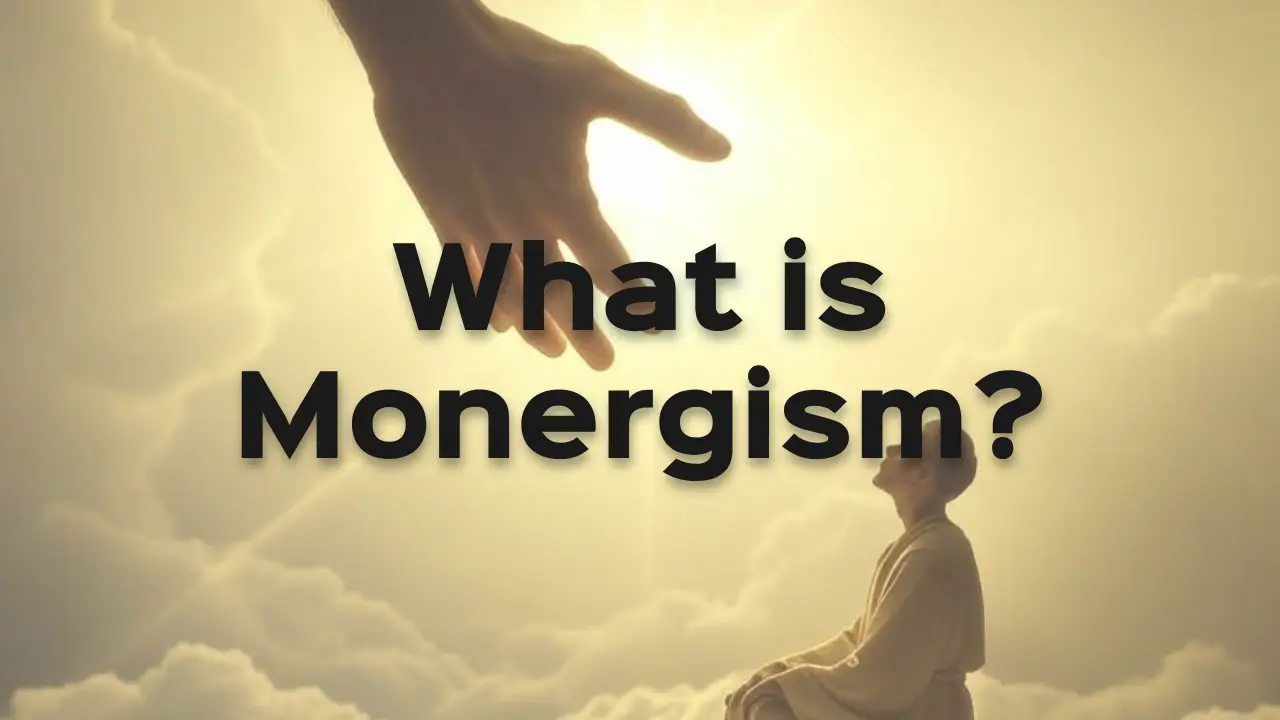Monergism, a theological doctrine rooted in Christian soteriology, deriving from the Greek words monos (alone) and ergon (work), signifying that salvation is entirely God’s work, without human contribution. This doctrine is central to Reformed and much of Lutheran theology, it contrasts with synergism, which holds that humans cooperate with divine grace to achieve salvation. Monergism emphasizes God’s sovereignty, the sufficiency of His grace, and humanity’s utter dependence on God for redemption. In this article we will explore the theological foundations, historical development, and modern relevance of monergism, while addressing its distinctions from synergism and responding to common critiques.
Theological Foundations
At its core, monergism asserts that God alone initiates and completes the work of salvation. Human beings, spiritually dead due to the Fall, lack the capacity to contribute to their redemption. This view aligns with the Reformation principle of sola gratia (by grace alone), where even faith itself is a divine gift, not a human work. Scripture underpins this doctrine, with passages like Ephesians 2:8-9 describing salvation as a gift from God, not a result of human works, and John 6:44 emphasizing that no one comes to Christ unless drawn by the Father. Romans 9:16 further clarifies that salvation hinges on God’s mercy, not human will or effort, while Ezekiel 36:26-27 portrays God’s transformative act of giving a new heart and spirit.
The doctrine of total depravity, a key element of Reformed theology, reinforces monergism by teaching that humanity’s sinful nature renders it incapable of choosing God without divine intervention. Similarly, the concept of irresistible grace holds that when God elects to save, His grace effectually regenerates the heart, ensuring a response of faith. This grace distinguishes monergism from synergistic views, which see grace as enabling but not guaranteeing salvation.
Historical Development
The roots of monergism trace back to Augustine of Hippo, whose writings against Pelagius emphasized the necessity and sufficiency of God's grace. Augustine argued that humans, born in sin, require God’s independent action to be saved, a view articulated in works like On Grace and Free Will. This perspective heavily gained prominence during the Protestant Reformation, as Martin Luther and John Calvin championed salvation by grace alone. Luther’s Bondage of the Will asserted that human will, enslaved to sin, cannot choose God without divine enablement, while Calvin’s Institutes of the Christian Religion systematized monergistic theology, particularly through the doctrine of predestination. The Canons of Dort, a series of statements of doctrine written in response to the Arminian controversy in the early 17th century, later solidified monergism in Reformed orthodoxy, responding to the synergistic tendencies of Arminianism.
Monergism and Synergism Compared
Monergism stands in sharp contrast to synergism. While monergism insists that salvation is entirely God’s work, synergism posits that humans cooperate with grace, retaining some capacity to accept or reject it. Monergism prioritizes divine sovereignty, viewing grace as transformative and effectual, whereas synergism emphasizes human free will, seeing grace as cooperative. These differences sparked significant theological debates, particularly during the Reformation, and continue to shape discussions on human responsibility and divine initiative.
Influential Thinkers
Throughout history, key figures have shaped monergistic thought. Augustine laid the groundwork by defending divine grace against human merit. Luther and Calvin advanced this doctrine during the Reformation, emphasizing the bondage of the will and God’s sovereignty. In the 18th century, Jonathan Edwards reinforced monergism through works like Freedom of the Will, while modern theologians like R.C. Sproul have popularized it through accessible teaching.
Monergism Today
In contemporary Christianity, monergism remains influential, particularly within Reformed and evangelical communities. Ministries like Ligonier and The Gospel Coalition promote its teachings, and the rise of New Calvinism, led by figures like John Piper, has brought monergism to a new generation. Critics, however, argue that it undermines human responsibility or portrays God as arbitrary. Monergists counter that divine sovereignty and human responsibility coexist, pointing to passages such as Philippians 2:12-13, which urges believers to work out their salvation while acknowledging God’s work within them.
Objections to monergism often center on its perceived denial of free will, with critics claiming it renders salvation deterministic. Monergists respond that humans act according to their desires, which God’s grace reshapes in salvation. Another critique suggests that monergism’s emphasis on predestination is unfair, to which proponents reply that God’s choice to save some is an act of mercy, not injustice, given humanity’s universal guilt. Some also argue that monergism dampens evangelism, but monergists assert that God ordains both the outcome of salvation and the means, such as preaching, making evangelism vital.
Conclusion
Monergism offers a perspective on salvation, celebrating God’s sovereignty and the transformative power of His grace. Grounded in Scripture and refined through centuries of theological reflection, this doctrine underscores humanity’s dependence on God's grace for redemption. Though it sparks debate, monergism continues to inspire awe at God’s unmerited grace. For those eager to delve deeper, Calvin’s Institutes or Sproul’s writings provide rich resources, while engaging with both monergistic and synergistic views can enrich one’s understanding of Christian soteriology.






